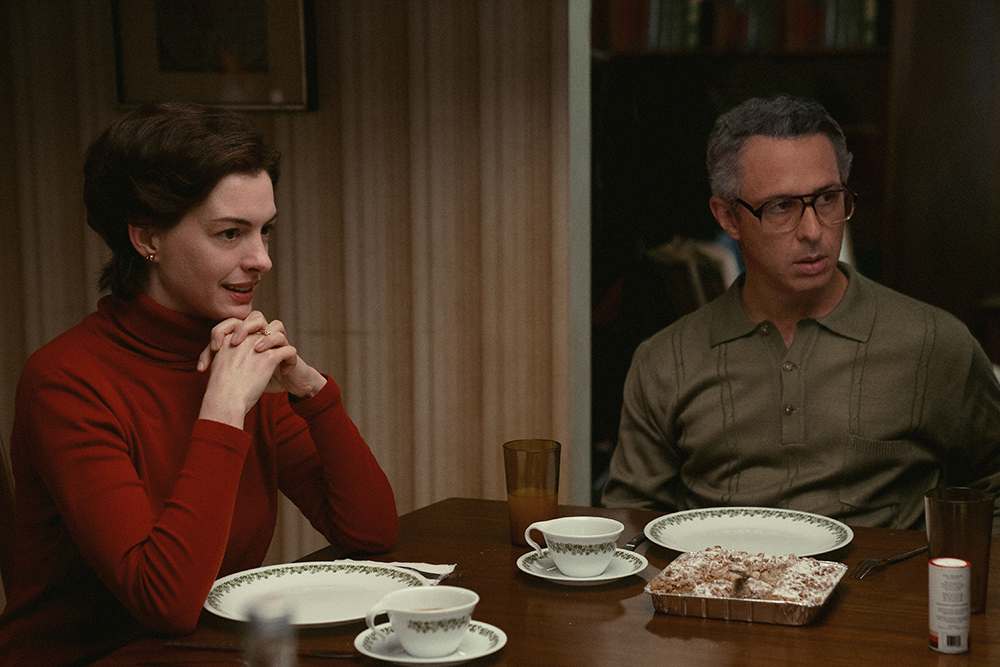In a banner year for reflective, coming-of-age films, James Gray’s “Armageddon Time” belongs to the blended family that includes the scabrous, foul-mouthed indie “Funny Pages” and the polished, star-studded “The Fabelmans.” Whereas each of those could be simplified as: a love letter to the movies (“The Fabelmans”), comic books (“Funny Pages”), a mother (“Fabelmans”) and Trenton, NJ (“Pages”), it’s harder to pin down what Gray hoped to accomplish with his chilly rendering of his own childhood in Queens. Watching the film gives the sense that we’re reading a grown man’s journal, with select memories crossed out, underlined and re-edited decades after the fact. And while there are sprouts of energy that help redeem the bungling delivery of certain key themes, the characters’ arcs feel perfunctory, bogging down a film that conveys emotions and messages in broad strokes, reducing the potency of this story.
When Gray zooms his attention out from the life of Paul Graff (Banks Repeta), a protagonist who, like the other two films, dreams of making it as an artist and into political commentary, it becomes a cloying period piece, heavy on moralizing. Gray’s big messages can be summed up in a few speeches, including one in which Paul’s grandpa (Anthony Hopkins) chides him for turning his back on his best friend Johnny (Jaylin Webb). Hopkins, splendid as always, steals his scenes, but the film would have benefitted from spending even more time analyzing — versus simplifying — this complex relationship between Paul, from a middle-class Jewish family, and Johnny, a Black boy who halfway through the movie is effectively homeless, dodging the city’s foster care system.
Gray’s Film Can Be Heavy on Moralizing
Johnny and Paul first meet on the first day of sixth grade, and both earn the ire of Mr. Turkeltaub (Andrew Polk). Gray begins to show his hand here, with Johnny receiving outsized punishment compared to Paul. Both are assigned clean-up duty, but only Johnny is sent to the principal’s office for his turn as class clown. On a class trip to The Guggenheim, Johnny and Paul ditch their classmates and take the subway downtown to an arcade and record store. Paul was raised on The Beatles, but he’s exhilarated when Johnny introduces him to Sugar Hill Gang. When Johnny is talking to Paul with palpable enthusiasm about NASA space camp, a stranger interrupts him to tell him that there’s no way a Black kid will ever go to space. It’s a gut-punch, a tender moment stifled, shocking both kids to examine how different their worlds are, and will be.
Paul insists to Johnny that his family is rich, elevating the status of his mom Esther (Anne Hathway), who heads the PTA and has local government ambition, and Irving (Jeremy Strong), a water-heater repairman. It’s a charming and believable fib, true to how a child might perceive his family’s reach. And Paul’s brother Ted (Ryan Sell) does attend an expensive boarding school, but it’s thanks to the generosity of his grandparents (Tovah Feldshuh plays Hopkins’ wife). The film’s best scenes take place in the home: at the dinner table with the extended family, watching TV, united in their animus against Reagan, and when Irving wakes up his boys with pots, pans, and a classic dad dance, all hips and shoulders. Here, there’s a keen grasp of the family’s inner life, the ordinary conflicts between son and son, father and sons, mother and father.
Gray Struggles Amidst the Film’s Successes
But Gray struggles to reconcile the relationships’ complexities. One moment, Irving is caustic and abusive, and at the end of the film, he’s given a shot at redemption, preaching to Paul after picking him up from jail while Johnny remains in police custody. It’s a simplified explanation of how fairness rarely wins the day and how it sucks to be Johnny but it should suck a lot less to be Paul. It’s not the message that’s unbelievable, it just strains credibility that this temperamental patriarch would turn so sharply in favor of empathy, when in an earlier harrowing scene he was whipping Paul with a belt for smoking at school.

Gray’s film is an effective evocation of time (Reagan’s 1980s) and place (the Trumps’ New York City), but it stretches too thin, casually dissecting socioeconomic injustices instead of emphasizing Johnny and Paul. Sure, they’re both cogs in a machine, but they’re kids, happiest when they’re goofing off in class or, in what has to be a direct homage to “The 400 Blows” (1959), scheming to sell a computer to finance a dream trip to Florida. The outcome of that grift is too predictable, framing Johnny as a helpless criminal instead of allowing him the redemption afforded to Irving. It may be true to life, or to the message Gray wants to convey. However, Johnny’s hardships and Paul’s — and the world’s — indifference to them is given a passing glance. In the end, Gray’s film amounts to a shoulder-shrug that dispenses only minimal effort to implicate Paul’s family.
Shrouded by Good Intentions
Johnny and Paul dream big, and maybe Gray swung too hard in trying to capture all of what was happening around them, as opposed to considering what these two rambunctious pals really want: acceptance, independence, to eat dumplings and play video games. Each boy is a victim — or, in Paul’s case, a beneficiary — of a scenario neither had control over, and Gray offers no facile solution or indication that these were the good old days, nor does the film suggest things much better now. Still, “Armageddon Time” is both shrouded in and clouded by good intentions, falling flat as a revisionist memoir that is supposed to make us feel the lessons learned are our own. It’s not black and white, there’s always a shade of gray.
“Armageddon Time” is now available to stream on most major platforms.